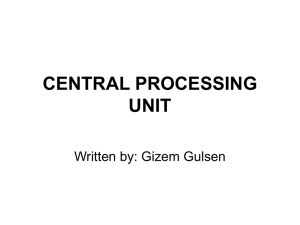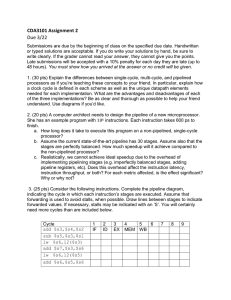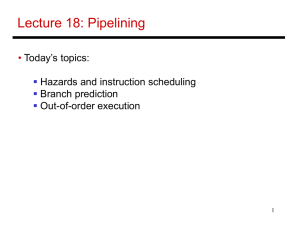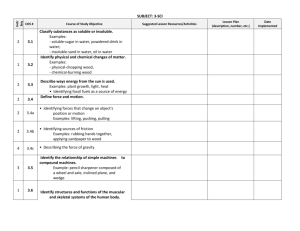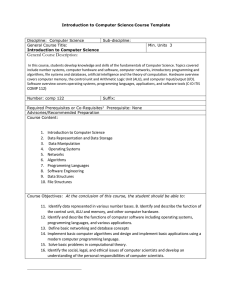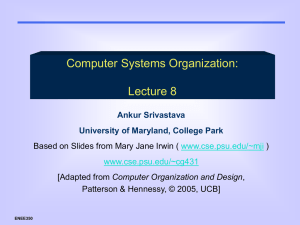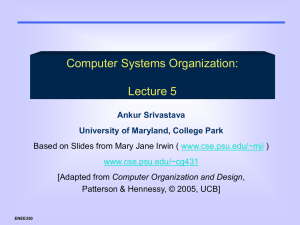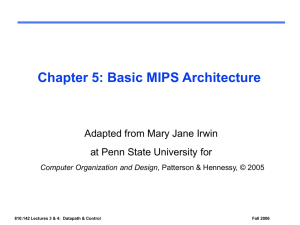Lecture 19: Branches, OOO • Today’s topics: Instruction scheduling
advertisement
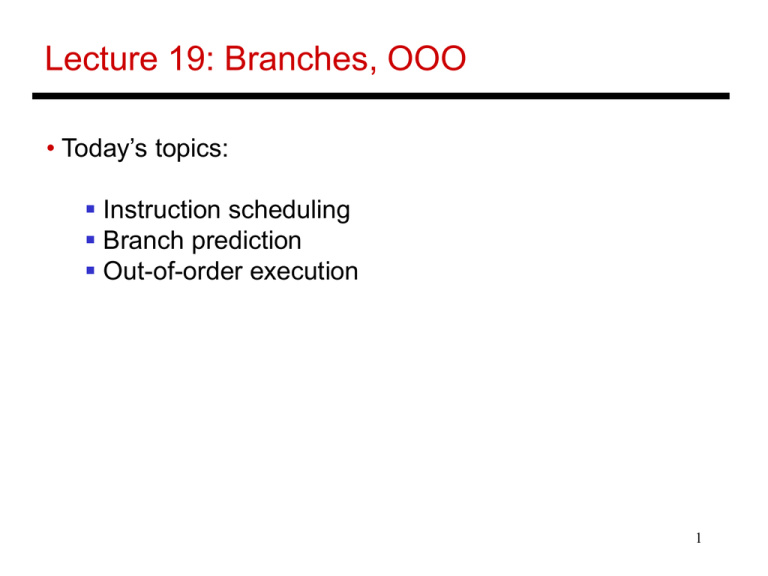
Lecture 19: Branches, OOO • Today’s topics: Instruction scheduling Branch prediction Out-of-order execution 1 Example 4 A 7 or 9 stage pipeline IF lw add IF Dec Dec RR ALU RW ALU DM DM RW $1, 8($2) $4, $1, $3 2 Example 4 Without bypassing: 4 stalls IF:IF:DE:DE:RR:AL:DM:DM:RW IF: IF :DE:DE:DE:DE:DE :DE:RR:AL:RW With bypassing: 2 stalls IF:IF:DE:DE:RR:AL:DM:DM:RW IF: IF :DE:DE:DE:DE:RR :AL:RW IF IF Dec Dec RR ALU ALU RW DM lw $1, 8($2) add $4, $1, $3 DM RW 3 Control Hazards • Simple techniques to handle control hazard stalls: for every branch, introduce a stall cycle (note: every 6th instruction is a branch!) assume the branch is not taken and start fetching the next instruction – if the branch is taken, need hardware to cancel the effect of the wrong-path instruction fetch the next instruction (branch delay slot) and execute it anyway – if the instruction turns out to be on the correct path, useful work was done – if the instruction turns out to be on the wrong path, hopefully program state is not lost make a smarter guess and fetch instructions from the expected target 4 Branch Delay Slots 5 Source: H&P textbook Pipeline without Branch Predictor IF (br) PC Reg Read Compare Br-target PC + 4 6 Pipeline with Branch Predictor IF (br) PC Branch Predictor Reg Read Compare Br-target 7 Bimodal Predictor 14 bits Branch PC Table of 16K entries of 2-bit saturating counters 8 2-Bit Prediction • For each branch, maintain a 2-bit saturating counter: if the branch is taken: counter = min(3,counter+1) if the branch is not taken: counter = max(0,counter-1) … sound familiar? • If (counter >= 2), predict taken, else predict not taken • The counter attempts to capture the common case for each branch 9 Slowdowns from Stalls • Perfect pipelining with no hazards an instruction completes every cycle (total cycles ~ num instructions) speedup = increase in clock speed = num pipeline stages • With hazards and stalls, some cycles (= stall time) go by during which no instruction completes, and then the stalled instruction completes • Total cycles = number of instructions + stall cycles 10 Multicycle Instructions • Multiple parallel pipelines – each pipeline can have a different number of stages • Instructions can now complete out of order – must make sure that writes to a register happen in the correct order 11 An Out-of-Order Processor Implementation Reorder Buffer (ROB) Instr 1 Instr 2 Instr 3 Instr 4 Instr 5 Instr 6 Branch prediction and instr fetch R1 R1+R2 R2 R1+R3 BEQZ R2 R3 R1+R2 R1 R3+R2 Instr Fetch Queue Decode & Rename T1 T2 T3 T4 T5 T6 T1 R1+R2 T2 T1+R3 BEQZ T2 T4 T1+T2 T5 T4+T2 Register File R1-R32 ALU ALU ALU Results written to ROB and tags broadcast to IQ Issue Queue (IQ) 12 Example Code Completion times ADD ADD LW ADD ADD LW ADD ADD R1, R2, R3 R4, R1, R2 R5, 8(R4) R7, R6, R5 R8, R7, R5 R9, 16(R4) R10, R6, R9 R11, R10, R9 with in-order with ooo 5 6 7 9 10 11 13 14 5 6 7 9 10 7 9 10 13 Title • Bullet 14
